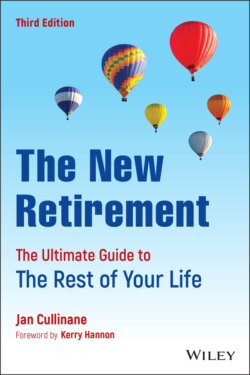Читать книгу The New Retirement - Jan Cullinane - Страница 17
Where to Retire
ОглавлениеThe 1981 punk rock band The Clash released the catchy “Should I Stay or Should I Go?” They obviously weren't singing about picking up stakes and moving after leaving your primary career or at some point in your retirement, but it's an important question to consider and discuss. Are some places better than others? The short answer is yes.
As mentioned in the Introduction, the pandemic has had an effect on migration patterns within the United States. People realized working remotely is not only an option, but in many cases it's a new normal. Good weather and open spaces that allow you to walk, bike, eat, and play outdoors year-round have become much more desirable. I live in Florida, and I have seen a huge influx of people of all ages relocating and purchasing homes and condos. For example, Marie L.'s oceanfront condo in Florida sold in two days to a New York buyer who purchased it without checking it out in person.
A clever way of determining overall migration patterns is seeing where moving companies are packing up people – and unpacking them. The 2020 U.S. Moving Migration Patterns Report from North American Moving Services lists these states with the most outbound moves: Illinois, New York, California, New Jersey and Maryland. Inbound moves? Idaho, Arizona, South Carolina, Tennessee, North Carolina, Florida, Texas, and Utah.
If we drill down and look at Boomer migration patterns, Realtor.com analyzed who looked up home sales on their site throughout the United States from ZIP codes where at least 4 out of 10 people were Boomers. (As an aside, it's a little disconcerting to see how we are tracked.)
The top 10 locations that these Boomers looked for online were cities in … Florida! If we examine their data a little more broadly, areas in North Carolina, South Carolina, and Georgia were represented. I guess it really is “better at the beach.”
When those who recently retired are asked about relocating after leaving a primary career, the fairly standard answer is that they want to “age in place.” I get that – you may have lifelong friends, children, grandchildren, many ties to the community, and love where you live. For example, David K. is a homegrown Florida guy. He grew up, went to college, founded his financial services company, and continues to happily live in Florida. I grew up and went to high school and earned my bachelor's and master's degrees in Maryland, but also lived and worked in New Jersey (and was working toward my doctorate there), relocated to Ohio due to my husband's corporate transfer, and moved to Florida in 2006. I can work virtually.
You may be born, grow up, retire, and die in the same area. That plan works for many. But, Chapter 5 suggests possibilities for relocation (including “niche” communities such as living on a ship or in a new “green” city), things you should consider when buying or renting a home or if you're considering more than one retirement location, what you must do if you decide to age in place, and what to do when you can no longer care for yourself or your loved ones.
